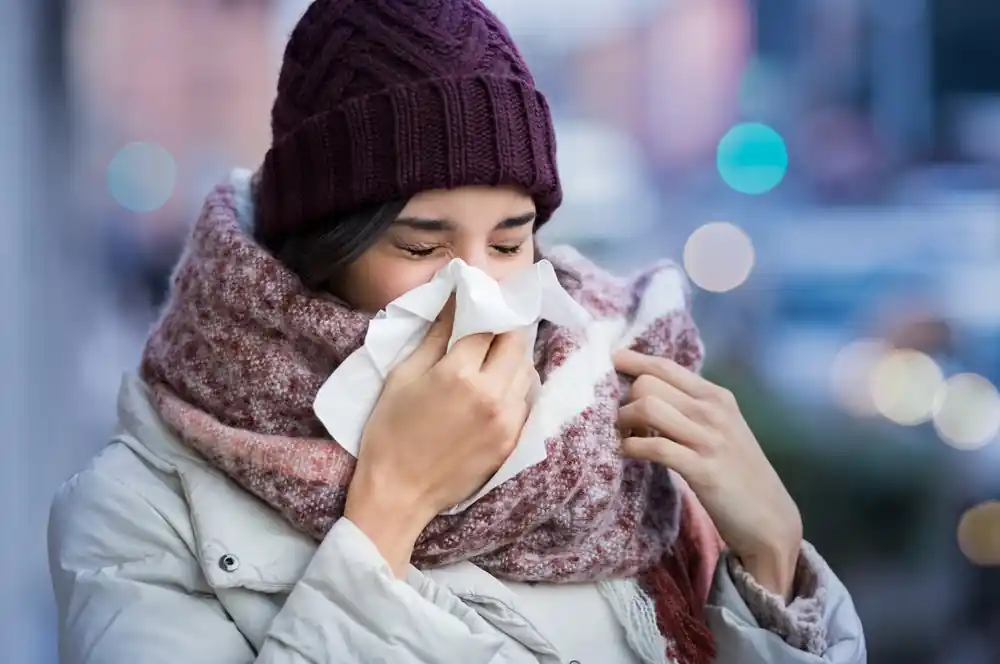By Desmond Nleya
As the UAE transitions into the cooler winter months, the risk of seasonal illnesses tends to rise. While the weather is a welcome relief from the summer heat, conditions such as the common cold, influenza, bronchitis, pneumonia, respiratory syncytial virus (RSV), sinus infections, eye infections, and dry skin become more prevalent. Understanding the causes, symptoms, prevention, and treatment of these health issues is key to staying healthy during the season.
1. Common Cold
Cause: Viral infection, often spread through droplets or contact with contaminated surfaces.
Symptoms: Sneezing, runny or stuffy nose, sore throat, mild fatigue.
Prevention: Regular handwashing, avoiding close contact with sick individuals, and boosting immunity with a balanced diet.
Treatment: Usually self-limiting; rest, hydration, and over-the-counter remedies help ease symptoms.
2. Influenza (Flu)
Cause: Influenza viruses, often spreading rapidly in workplaces, schools, and crowded areas.
Symptoms: Sudden high fever, body aches, chills, cough, sore throat, and extreme tiredness.
Prevention: Annual flu vaccine (highly recommended in the UAE during winter), practicing good hygiene, and wearing masks in crowded places.
Treatment: Antiviral medications (if prescribed early), rest, and fluids.
3. Bronchitis
Cause: Inflammation of the bronchial tubes, usually due to viral infections, sometimes triggered by exposure to dust or smoking.
Symptoms: Persistent cough with mucus, chest discomfort, fatigue.
Prevention: Avoiding cigarette smoke, dust exposure, and managing asthma or allergies.
Treatment: Supportive care, cough suppressants, and in some cases antibiotics (if bacterial).
4. Pneumonia
Cause: Bacterial, viral, or fungal infection of the lungs.
Symptoms: High fever, cough with phlegm, chest pain, difficulty breathing.
Prevention: Pneumonia and flu vaccines, strengthening immunity, avoiding crowded and poorly ventilated spaces.
Treatment: Medical evaluation is essential—antibiotics for bacterial pneumonia, antivirals for viral cases, plus supportive oxygen therapy if severe.
5. Respiratory Syncytial Virus (RSV)
Cause: A contagious virus affecting the respiratory tract, particularly dangerous for infants and the elderly.
Symptoms: Runny nose, wheezing, cough, difficulty breathing, and fever.
Prevention: Good hand hygiene, avoiding close contact with infected persons, and keeping vulnerable children away from crowded spaces.
Treatment: Supportive care—fluids, oxygen, and in severe cases, hospitalization.
6. Sinus Infections (Sinusitis)
Cause: Viral, bacterial, or allergic reactions leading to inflamed sinuses.
Symptoms: Facial pressure, nasal congestion, thick discharge, headache.
Prevention: Managing allergies, using humidifiers in dry indoor environments, and avoiding sudden exposure to cold air.
Treatment: Decongestants, nasal sprays, antibiotics (if bacterial), and steam inhalation.
7. Eye Infections
Cause: Viral, bacterial, or allergic irritations, worsened by dry and dusty winter winds in the UAE.
Symptoms: Redness, itching, swelling, discharge, watery eyes.
Prevention: Avoid touching eyes with unwashed hands, wearing protective eyewear outdoors, and keeping lenses clean.
Treatment: Prescribed antibiotic or antiviral eye drops, antihistamines for allergy-related infections.
8. Dry Skin Conditions
Cause: Cold air, low humidity, and indoor heating strip moisture from the skin.
Symptoms: Itching, flaking, cracks, or irritation.
Prevention: Regular moisturizing, using mild soaps, drinking enough water, and using humidifiers indoors.
Treatment: Application of dermatologically recommended creams, ointments, and avoiding hot water baths.
The UAE’s winter, though mild compared to many parts of the world, still presents unique health challenges. Preventive measures such as vaccinations, proper hygiene, hydration, and appropriate clothing can go a long way in reducing the risk of infections. Families, especially those with young children and elderly members, should remain vigilant and seek prompt medical care when symptoms escalate.
Staying healthy this winter is not just about treatment—it’s about prevention, awareness, and timely action.


